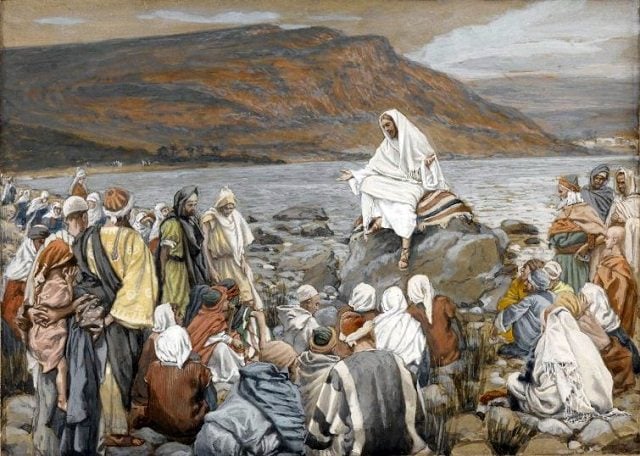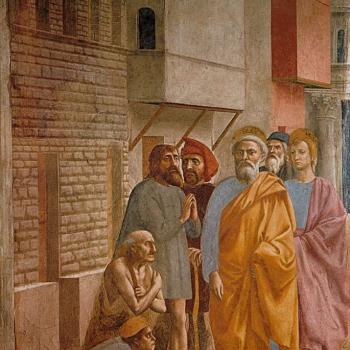But I think the Scriptures lead us to a different conclusion. Jesus spoke to the multitudes at all times in parables:
34 All these things Jesus said to the crowds in parables; indeed, he said nothing to them without a parable. 35 This was to fulfill what was spoken by the prophet: “I will open my mouth in parables; I will utter what has been hidden since the foundation of the world” (Matthew 13:34-35, emphasis mine).
Jesus explains to His disciples the reason why He teaches the crowds in parables in Matthew 13:10-13:
10 Then the disciples came and said to him, “Why do you speak to them in parables?” 11 And he answered them, “To you it has been given to know the secrets of the kingdom of heaven, but to them it has not been given. 12 For to the one who has, more will be given, and he will have an abundance, but from the one who has not, even what he has will be taken away. 13 This is why I speak to them in parables, because seeing they do not see, and hearing they do not hear, nor do they understand” (emphasis mine).
Luke puts it similarly but a bit more starkly when he says, “…To you it has been given to know the secrets of the kingdom of God, but for others they are in parables, so that ‘seeing they may not see, and hearing they may not understand” (Luke 8:10, emphasis mine).
Scripture indicates that when Jesus speaks to the crowds He uses parables, but when He speaks to His own He elaborates clearly the meaning of the parables. When He taught in the temple his plain speaking caused the Jewish leaders to conspire to harm Him (Luke 6:6-11; John 8:48-59). His discourse with Nicodemus, for example, is spiritual language to illustrate literal truths, but Jesus doesn’t leave Nicodemus “hanging” like He does with many of those in the crowds. Instead He presses him to keep asking questions so that he might finally understand what Jesus is teaching him. The import of this scene is that Jesus clearly wants Nicodemus to understand Him.
Yes; so far I completely agree. This is all true.
It is not Jesus’ intention that everyone will understand what He is saying because it is not His intention to save every human being. Only those who were “appointed to eternal life” (Acts 13:48) would understand and believe Him. If anyone has a saving knowledge about the kindgom of heaven it’s because it was given to him by the Spirit. And what he has will increase. But those to whom life is not granted, “even what he has will be taken away.” This also ties in with what the Bible has to say about the Spirit hardening and softening hearts.
Moreover, it seems clear that the disciples that Jesus takes aside for the purpose of explaining the meaning of the parables are the chosen twelve, and perhaps some others that belonged to Him “…For Jesus knew from the first who those were that did not believe…” (John 6:64). The other “disciples” mentioned are followers who gave up after awhile as they wrestled with the “hard sayings” of Jesus. Not only were the bread of life, and the eating of the flesh and drinking of the blood hard sayings, but the immediate context indicates that the people stopped following Him when they heard that in order to be saved they had to first be drawn to Jesus by the Father: [65] And he said, “This is why I told you that no one can come to me unless it is granted him by the Father” (John 6:65, emphasis mine).
I agree with some of this, but disagree with the Calvinist interpretation of limited atonement and God not desiring to save everyone; also, the hardening of hearts is not a unilateral action of God; it is primarily the free will actions of those who rebel against Him, coupled with providential and anthropopathic language. I’ve written about the “hardening” issue elsewhere, and in any event, this whole line of thought departs from the question at hand (the Eucharist and John 6). Jesus knows that some will believe and some will not. But this has no effect on His “policy” of explaining His parables and deeper teachings to His disciples, as opposed to the larger masses of folk. We agree on that (you have just demonstrated that this is the case, from Scripture). But as we shall soon see, this very observation creates a major difficulty in your position, not mine.
Finally, it’s striking to note that of all four gospels, John is the only one that does not record for us the institution of the Lord’s Supper. If chapter 6 is truly teaching about the Eucharist, how could John neglect to tell us about the institution of this important sacrament which would have taken place a year after the events recorded in chapter 6? It’s an argument from silence, I admit, but it is nonetheless compelling.
I think it is unarguable that not every detail of our Lord’s life and mission necessarily needs to appear in each Gospel. It is why we have four, after all: they all complement each other and provide their own unique features and details. So, far from being some difficulty, this is altogether to be expected. It’s a non-issue.
That said; John does indirectly refer to the Last Supper (wherein the institution occurs), by referencing the Passover meal and Judas’ betrayal (13:1-2).
Secondly, the motif of the greatest being the servant of all (13:12-16) is present in accounts in the Synoptics also.
Thirdly, the Johannine narrative takes up Judas’ betrayal again, in a very clear parallel to the Synoptic Last Supper stories (13:21-30). John provides the detail of the morsel given to Judas, thus identifying the betrayer to Peter and John (13:23-26). We see a similar detail in, e.g., Matthew 26:20-23.
Fourth, the prediction of Peter’s denials occurs in John and the synoptics (cf. e.g., Matt. 26:33-35 with John 14:37-38).
Fifth, Jesus refers to going away and returning to the disciples (cf. Matt. 26:31-32 with John 14:1-3,18-20).
Therefore, the same events are being referred to. John wasn’t required to record the institution of the Eucharist because there was no need to (the Synoptics having provided that). John gives many details that the other three do not provide. This approach, then, offers no disproof of the Catholic eucharistic position at all. It’s a rabbit trail that dead ends.
Returning to the central point; you have contended that Jesus tells His disciples what His parables mean, but not the larger crowds. This is explicitly stated in Matthew 13:10-11 and Luke 8:9-10: passages you yourself cited in whole or in part, above. And note that the “disciples” were not just the Twelve, but included also at least the “seventy” mentioned in Luke 10:1 ff.: sent out to preach the gospel and heal the sick (10:9) and to cast out demons (10:17), by the express power of Jesus (10:19-20). Jesus “rejoiced” upon their enthusiastic report and thanked His Father, “that thou hast hidden these things from the wise and understanding and revealed them to babes . . .” (10:21): language quite similar to the parables being understood by disciples and not all the masses at large.
Fast forward, then, to John 6, and who is being referred to? “His disciples” (three times: 6:60-61, 66). We have already agreed and established that Jesus revealed the inner secrets and deeper teachings of the gospel of the kingdom to His disciples. That is who these people are.
Therefore, by all your reasoning and all indication of Holy Scripture, He would surely have revealed this teaching to these disciples who deserted Him (just as I stated, and the same thing you set out to dispute, above). But He did not. Therefore, plainly it wasn’t a matter of His teaching not being understood or comprehended, but a matter of it being rejected (as the text expressly asserts in 6:61,64), because He always explained the deeper meanings to His disciples, and these were His disciples.
He didn’t have to explain in this instance because it was a matter of not accepting what was understood, rather than not understanding what needed to be accepted. After all, being betrayed or abandoned even by the twelve didn’t stop Jesus from explaining all things to them. Peter was the leader of the disciples all along, and Jesus knew he would deny Him, but that didn’t prevent Him from sharing more deeply with Peter than any other disciple. Jesus refers to the abandonment of the twelve (well, eleven), even in the midst of His detailed teaching in John 13-17:
John 16:32 The hour is coming, indeed it has come, when you will be scattered, every man to his home, and will leave me alone; yet I am not alone, for the Father is with me.
So knowing that someone would betray or reject or temporarily abandon Him did not stop Jesus from teaching His own disciples. Even Judas received many firsthand teachings from Jesus.
Therefore, He would have gone on to explain things properly and in more detail (until they “got” it) to the disciples of John 6 who deserted Him because they couldn’t accept the Real Presence and eucharistic realism. He didn’t, precisely because they understood and were hardhearted. When Jesus knows that (speaking generally now), He explains no further, but challenges (e.g., Matthew 23 and the hypocrisy of the Pharisees), or falls silent (as in most of His trial). And that is what happened in this instance. The “argument from parables against the Catholic interpretation of John 6” thus falls flat; it collapses in a heap.
Mark 4:10-12 10 And when he was alone, those around him with the twelve asked him about the parables. 11 And he said to them, “To you has been given the secret of the kingdom of God, but for those outside everything is in parables, 12 so that “they may indeed see but not perceive, and may indeed hear but not understand, lest they should turn and be forgiven.”
This further confirms my argument, because note that the secrets are told not just to the Twelve but also to “those around him with the twelve.”
This could mean that Jesus uses parables to increase the crowd’s understanding. However, then I would have to believe that when Jesus does speak plainly to the crowds, they don’t understand him. Really? The examples of the crowds and the Jewish leaders taking up stones to kill him in other parts of the Scriptures should remove all doubt as to whether they understood Him or not. No, it’s the parables that the crowds don’t understand, not the plain teaching. If Jesus wanted to be understood by everyone, then why didn’t He just stick to plain teaching? And the text is clear about the reason why:“…but to them it has not been given.” Even in this very passage, John 6:41 ff., the Jews understood exactly what Jesus meant–that He was pre-existent with the Father and came down from heaven.
That’s right. He explains to His disciples, and that is who the listeners in John 6 were. But He didn’t explain further there when they started grumbling and murmuring. Therefore, this shows (via plausibility by extensive direct analogy of similar scenarios) that they disbelieved His teaching (which is the Real, Substantial Presence in the Holy Eucharist). They refused to give the assent of faith, even with an incomplete understanding, and so left.
And Luke, as I said, puts it more starkly:
“…To you it has been given to know the secrets of the kingdom of God, but for others they are in parables, so that ‘seeing they may not see, and hearing they may not understand’ (Luke 8:10, emphasis mine).
Why does He say this? Well, because Jesus is quoting from Isaiah 6 (as He clearly states in Matthew 13:13-15) in which Isaiah has a vision of the Lord, at which time the Lord gives him instructions:
8 And I heard the voice of the Lord saying, “Whom shall I send, and who will go for us?” Then I said, “Here am I! Send me.” 9 And he said, “Go, and say to this people: ‘Keep on hearing, but do not understand; keep on seeing, but do not perceive.’ 10 Make the heart of this people dull, and their ears heavy, and blind their eyes; lest they see with their eyes, and hear with their ears, and understand with their hearts, and turn and be healed.”
Yep. I think you have argued yourself into a corner, by noting correctly that Jesus reveals secrets to His disciples. That clinches the very argument I was trying to make in my original post. You did much of my work for me. Thanks! Much obliged! :-)
The fact that Jesus always does this proves that it was not a matter of mere misunderstanding (thinking the Eucharist was cannibalism and suchlike). They refused to (willed not to) believe and exercise faith (as Abraham did, when he didn’t understand God’s purposes). They were like Doubting Thomases. And what they rejected was eucharistic realism: precisely as Protestants today do. It requires more faith than symbolism or mystical, spiritual presence (whatever that is, beyond the omnipresence that is always occurring). They didn’t yet have it, and they decided not to try to stick around in order to get it.
Often, belief in the Real, Substantial Presence of Jesus Christ in the Eucharist or transubstantiation, is the first thing a Catholic ditches, on the way out of the Catholic faith. Many, sadly, have the skeptical outlook of the former disciples of John 6. This flies against the Bible itself and the overwhelming consensus of the greatest teachers in the early Church. And that ought to give anyone significant pause.













